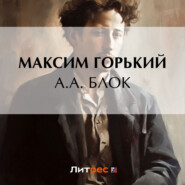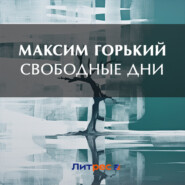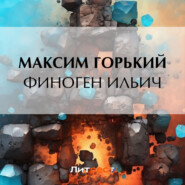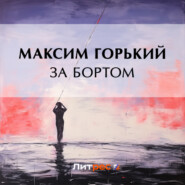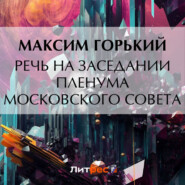По всем вопросам обращайтесь на: info@litportal.ru
(©) 2003-2025.
✖
Mother
Настройки чтения
Размер шрифта
Высота строк
Поля
"Some day you will speak to them, I think!"
He started, looked at his watch again, and asked in a hurry:
"So it's settled? You'll come over to me in the city?"
She silently nodded her head.
"When? Try to do it as soon as possible." And he added in a tender voice: "I'll be anxious for you; yes, indeed!"
She looked at him in surprise. What was she to him? With bent head, smiling in embarrassment, he stood before her, dressed in a simple black jacket, stooping, nearsighted.
"Have you money?" he asked, dropping his eyes.
"No."
He quickly whipped his purse out of his pocket, opened it, and handed it to her.
"Here, please take some."
She smiled involuntarily, and shaking her head, observed:
"Everything about all of you is different from other people. Even money has no value for you. People do anything to get money; they kill their souls for it. But for you money is so many little pieces of paper, little bits of copper. You seem to keep it by you just out of kindness to people."
Nikolay Ivanovich laughed softly.
"It's an awfully bothersome article, money is. Both to take it and to give it is embarrassing."
He caught her hand, pressed it warmly, and asked again:
"So you will try to come soon, won't you?"
And he walked away quietly, as was his wont.
She got herself ready to go to him on the fourth day after his visit. When the cart with her two trunks rolled out of the village into the open country, she turned her head back, and suddenly had the feeling that she was leaving the place forever – the place where she had passed the darkest and most burdensome period of her life, the place where that other varied life had begun, in which the next day swallowed up the day before, and each was filled by an abundance of new sorrows and new joys, new thoughts and new feelings.
The factory spread itself like a huge, clumsy, dark-red spider, raising its lofty smokestacks high up into the sky. The small one-storied houses pressed against it, gray, flattened out on the soot-covered ground, and crowded up in close clusters on the edge of the marsh. They looked sorrowfully at one another with their little dull windows. Above them rose the church, also dark red like the factory. The belfry, it seemed to her, was lower than the factory chimneys.
The mother sighed, and adjusted the collar of her dress, which choked her. She felt sad, but it was a dry sadness like the dust of the hot day.
"Gee!" mumbled the driver, shaking the reins over the horse. He was a bow-legged man of uncertain height, with sparse, faded hair on his face and head, and faded eyes. Swinging from side to side he walked alongside the wagon. It was evidently a matter of indifference to him whether he went to the right or the left.
"Gee!" he called in a colorless voice, with a comical forward stride of his crooked legs clothed in heavy boots, to which clods of mud were clinging. The mother looked around. The country was as bleak and dreary as her soul.
"You'll never escape want, no matter where you go, auntie," the driver said dully. "There's no road leading away from poverty; all roads lead to it, and none out of it."
Shaking its head dejectedly the horse sank its feet heavily into the deep sun-dried sand, which crackled softly under its tread. The rickety wagon creaked for lack of greasing.
CHAPTER II
Nikolay Ivanovich lived on a quiet, deserted street, in a little green wing annexed to a black two-storied structure swollen with age. In front of the wing was a thickly grown little garden, and branches of lilac bushes, acacias, and silvery young poplars looked benignly and freshly into the windows of the three rooms occupied by Nikolay. It was quiet and tidy in his place. The shadows trembled mutely on the floor, shelves closely set with books stretched across the walls, and portraits of stern, serious persons hung over them.
"Do you think you'll find it convenient here?" asked Nikolay, leading the mother into a little room with one window giving on the garden and another on the grass-grown yard. In this room, too, the walls were lined with bookcases and bookshelves.
"I'd rather be in the kitchen," she said. "The little kitchen is bright and clean."
It seemed to her that he grew rather frightened. And when she yielded to his awkward and embarrassed persuasions to take the room, he immediately cheered up.
There was a peculiar atmosphere pervading all the three rooms. It was easy and pleasant to breathe in them; but one's voice involuntarily dropped a note in the wish not to speak aloud and intrude upon the peaceful thoughtfulness of the people who sent down a concentrated look from the walls.
"The flowers need watering," said the mother, feeling the earth in the flowerpots in the windows.
"Yes, yes," said the master guiltily. "I love them very much, but I have no time to take care of them."
The mother noticed that Nikolay walked about in his own comfortable quarters just as carefully and as noiselessly as if he were a stranger, and as if all that surrounded him were remote from him. He would pick up and examine some small article, such as a bust, bring it close to his face, and scrutinize it minutely, adjusting his glasses with the thin finger of his right hand, and screwing up his eyes. He had the appearance of just having entered the rooms for the first time, and everything seemed as unfamiliar and strange to him as to the mother. Consequently, the mother at once felt herself at home. She followed Nikolay, observing where each thing stood, and inquiring about his ways and habits of life. He answered with the guilty air of a man who knows he is all the time doing things as they ought not to be done, but cannot help himself.
After she had watered the flowers and arranged the sheets of music scattered in disorder over the piano, she looked at the samovar, and remarked, "It needs polishing."
Nikolay ran his finger over the dull metal, then stuck the finger close to his nose. He looked at the mother so seriously that she could not restrain a good-natured smile.
When she lay down to sleep and thought of the day just past, she raised her head from the pillow in astonishment and looked around. For the first time in her life she was in the house of a stranger, and she did not experience the least constraint. Her mind dwelt solicitously on Nikolay. She had a distinct desire to do the best she could for him, and to introduce more warmth into his lonely life. She was stirred and affected by his embarrassed awkwardness and droll ignorance, and smiled to herself with a sigh. Then her thoughts leaped to her son and to Andrey. She recalled the high-pitched, sparkling voice of Fedya, and gradually the whole day of the first of May unrolled itself before her, clothed in new sounds, reflecting new thoughts. The trials of the day were peculiar as the day itself. They did not bring her head to the ground as with the dull, stunning blow of the fist. They stabbed the heart with a thousand pricks, and called forth in her a quiet wrath, opening her eyes and straightening her backbone.
"Children go in the world," she thought as she listened to the unfamiliar nocturnal sounds of the city. They crept through the open window like a sigh from afar, stirring the leaves in the garden and faintly expiring in the room.
Early in the morning she polished up the samovar, made a fire in it, and filled it with water, and noiselessly placed the dishes on the table. Then she sat down in the kitchen and waited for Nikolay to rise. Presently she heard him cough. He appeared at the door, holding his glasses in one hand, the other hand at his throat. She responded to his greeting, and brought the samovar into the room. He began to wash himself, splashing the water on the floor, dropping the soap and his toothbrush, and grumbling in dissatisfaction at himself.
When they sat down to drink tea, he said to the mother:
"I am employed in the Zemstvo board – a very sad occupation. I see the way our peasants are going to ruin."
And smiling he repeated guiltily: "It's literally so – I see! People go hungry, they lie down in their graves prematurely, starved to death, children are born feeble and sick, and drop like flies in autumn – we know all this, we know the causes of this wretchedness, and for observing it we receive a good salary. But that's all we do, really; truly all we do."
"And what are you, a student?"
"No. I'm a village teacher. My father was superintendent in a mill in Vyatka, and I became a teacher. But I began to give books to the peasants in the village, and was put in prison for it. When I came out of prison I became clerk in a bookstore, but not behaving carefully enough I got myself into prison again, and was then exiled to Archangel. There I also got into trouble with the governor, and they sent me to the White Sea coast, where I lived for five years."
His talk sounded calm and even in the bright room flooded with sunlight. The mother had already heard many such stories; but she could never understand why they were related with such composure, why no blame was laid on anybody for the suffering the people had gone through, why these sufferings were regarded as so inevitable.
"My sister is coming to-day," he announced.
"Is she married?"
"She's a widow. Her husband was exiled to Siberia; but he escaped, caught a severe cold on the way, and died abroad two years ago."
"Is she younger than you?"
"Six years older. I owe a great deal to her. Wait, and you'll hear how she plays. That's her piano. There are a whole lot of her things here, my books – "
"Where does she live?"
He started, looked at his watch again, and asked in a hurry:
"So it's settled? You'll come over to me in the city?"
She silently nodded her head.
"When? Try to do it as soon as possible." And he added in a tender voice: "I'll be anxious for you; yes, indeed!"
She looked at him in surprise. What was she to him? With bent head, smiling in embarrassment, he stood before her, dressed in a simple black jacket, stooping, nearsighted.
"Have you money?" he asked, dropping his eyes.
"No."
He quickly whipped his purse out of his pocket, opened it, and handed it to her.
"Here, please take some."
She smiled involuntarily, and shaking her head, observed:
"Everything about all of you is different from other people. Even money has no value for you. People do anything to get money; they kill their souls for it. But for you money is so many little pieces of paper, little bits of copper. You seem to keep it by you just out of kindness to people."
Nikolay Ivanovich laughed softly.
"It's an awfully bothersome article, money is. Both to take it and to give it is embarrassing."
He caught her hand, pressed it warmly, and asked again:
"So you will try to come soon, won't you?"
And he walked away quietly, as was his wont.
She got herself ready to go to him on the fourth day after his visit. When the cart with her two trunks rolled out of the village into the open country, she turned her head back, and suddenly had the feeling that she was leaving the place forever – the place where she had passed the darkest and most burdensome period of her life, the place where that other varied life had begun, in which the next day swallowed up the day before, and each was filled by an abundance of new sorrows and new joys, new thoughts and new feelings.
The factory spread itself like a huge, clumsy, dark-red spider, raising its lofty smokestacks high up into the sky. The small one-storied houses pressed against it, gray, flattened out on the soot-covered ground, and crowded up in close clusters on the edge of the marsh. They looked sorrowfully at one another with their little dull windows. Above them rose the church, also dark red like the factory. The belfry, it seemed to her, was lower than the factory chimneys.
The mother sighed, and adjusted the collar of her dress, which choked her. She felt sad, but it was a dry sadness like the dust of the hot day.
"Gee!" mumbled the driver, shaking the reins over the horse. He was a bow-legged man of uncertain height, with sparse, faded hair on his face and head, and faded eyes. Swinging from side to side he walked alongside the wagon. It was evidently a matter of indifference to him whether he went to the right or the left.
"Gee!" he called in a colorless voice, with a comical forward stride of his crooked legs clothed in heavy boots, to which clods of mud were clinging. The mother looked around. The country was as bleak and dreary as her soul.
"You'll never escape want, no matter where you go, auntie," the driver said dully. "There's no road leading away from poverty; all roads lead to it, and none out of it."
Shaking its head dejectedly the horse sank its feet heavily into the deep sun-dried sand, which crackled softly under its tread. The rickety wagon creaked for lack of greasing.
CHAPTER II
Nikolay Ivanovich lived on a quiet, deserted street, in a little green wing annexed to a black two-storied structure swollen with age. In front of the wing was a thickly grown little garden, and branches of lilac bushes, acacias, and silvery young poplars looked benignly and freshly into the windows of the three rooms occupied by Nikolay. It was quiet and tidy in his place. The shadows trembled mutely on the floor, shelves closely set with books stretched across the walls, and portraits of stern, serious persons hung over them.
"Do you think you'll find it convenient here?" asked Nikolay, leading the mother into a little room with one window giving on the garden and another on the grass-grown yard. In this room, too, the walls were lined with bookcases and bookshelves.
"I'd rather be in the kitchen," she said. "The little kitchen is bright and clean."
It seemed to her that he grew rather frightened. And when she yielded to his awkward and embarrassed persuasions to take the room, he immediately cheered up.
There was a peculiar atmosphere pervading all the three rooms. It was easy and pleasant to breathe in them; but one's voice involuntarily dropped a note in the wish not to speak aloud and intrude upon the peaceful thoughtfulness of the people who sent down a concentrated look from the walls.
"The flowers need watering," said the mother, feeling the earth in the flowerpots in the windows.
"Yes, yes," said the master guiltily. "I love them very much, but I have no time to take care of them."
The mother noticed that Nikolay walked about in his own comfortable quarters just as carefully and as noiselessly as if he were a stranger, and as if all that surrounded him were remote from him. He would pick up and examine some small article, such as a bust, bring it close to his face, and scrutinize it minutely, adjusting his glasses with the thin finger of his right hand, and screwing up his eyes. He had the appearance of just having entered the rooms for the first time, and everything seemed as unfamiliar and strange to him as to the mother. Consequently, the mother at once felt herself at home. She followed Nikolay, observing where each thing stood, and inquiring about his ways and habits of life. He answered with the guilty air of a man who knows he is all the time doing things as they ought not to be done, but cannot help himself.
After she had watered the flowers and arranged the sheets of music scattered in disorder over the piano, she looked at the samovar, and remarked, "It needs polishing."
Nikolay ran his finger over the dull metal, then stuck the finger close to his nose. He looked at the mother so seriously that she could not restrain a good-natured smile.
When she lay down to sleep and thought of the day just past, she raised her head from the pillow in astonishment and looked around. For the first time in her life she was in the house of a stranger, and she did not experience the least constraint. Her mind dwelt solicitously on Nikolay. She had a distinct desire to do the best she could for him, and to introduce more warmth into his lonely life. She was stirred and affected by his embarrassed awkwardness and droll ignorance, and smiled to herself with a sigh. Then her thoughts leaped to her son and to Andrey. She recalled the high-pitched, sparkling voice of Fedya, and gradually the whole day of the first of May unrolled itself before her, clothed in new sounds, reflecting new thoughts. The trials of the day were peculiar as the day itself. They did not bring her head to the ground as with the dull, stunning blow of the fist. They stabbed the heart with a thousand pricks, and called forth in her a quiet wrath, opening her eyes and straightening her backbone.
"Children go in the world," she thought as she listened to the unfamiliar nocturnal sounds of the city. They crept through the open window like a sigh from afar, stirring the leaves in the garden and faintly expiring in the room.
Early in the morning she polished up the samovar, made a fire in it, and filled it with water, and noiselessly placed the dishes on the table. Then she sat down in the kitchen and waited for Nikolay to rise. Presently she heard him cough. He appeared at the door, holding his glasses in one hand, the other hand at his throat. She responded to his greeting, and brought the samovar into the room. He began to wash himself, splashing the water on the floor, dropping the soap and his toothbrush, and grumbling in dissatisfaction at himself.
When they sat down to drink tea, he said to the mother:
"I am employed in the Zemstvo board – a very sad occupation. I see the way our peasants are going to ruin."
And smiling he repeated guiltily: "It's literally so – I see! People go hungry, they lie down in their graves prematurely, starved to death, children are born feeble and sick, and drop like flies in autumn – we know all this, we know the causes of this wretchedness, and for observing it we receive a good salary. But that's all we do, really; truly all we do."
"And what are you, a student?"
"No. I'm a village teacher. My father was superintendent in a mill in Vyatka, and I became a teacher. But I began to give books to the peasants in the village, and was put in prison for it. When I came out of prison I became clerk in a bookstore, but not behaving carefully enough I got myself into prison again, and was then exiled to Archangel. There I also got into trouble with the governor, and they sent me to the White Sea coast, where I lived for five years."
His talk sounded calm and even in the bright room flooded with sunlight. The mother had already heard many such stories; but she could never understand why they were related with such composure, why no blame was laid on anybody for the suffering the people had gone through, why these sufferings were regarded as so inevitable.
"My sister is coming to-day," he announced.
"Is she married?"
"She's a widow. Her husband was exiled to Siberia; but he escaped, caught a severe cold on the way, and died abroad two years ago."
"Is she younger than you?"
"Six years older. I owe a great deal to her. Wait, and you'll hear how she plays. That's her piano. There are a whole lot of her things here, my books – "
"Where does she live?"












